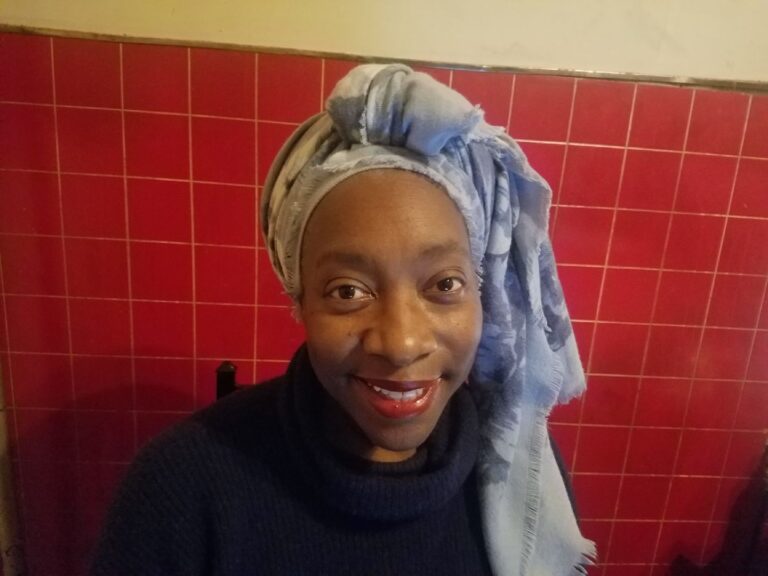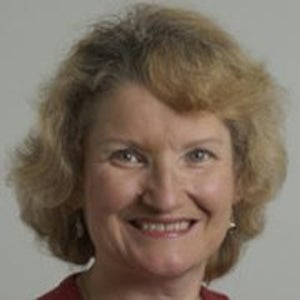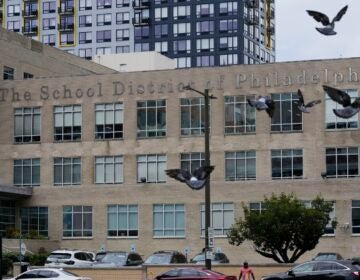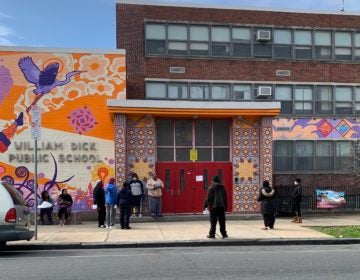One mail slot at a time: Veteran North Philly teacher fights to reach students during pandemic
Mattie Davis has 23 first graders in her North Philadelphia classroom. And she’s committed to reaching them, if necessary, one mail slot at a time.
Listen 4:41
Mattie Davis, 59, has been teaching in North Philadelphia for 29 years. (Photo by Bernadette Golden)
The Notebook and WHYY will be periodically checking in with two teachers for the rest of the academic year to see how they are coping with the move to virtual learning. We hope to recount their successes, discoveries, and frustrations. This is the first story in the series.
For the Philadelphia School District, the big number is 130,000. As the coronavirus shutdown settles in, that’s the number of students the District must now educate from a distance.
For Mattie Davis, the big number is 23. That’s the number of students in her North Philadelphia first grade classroom. And that’s the number of young educations she’s committed to saving, if necessary, one academic packet and one mail slot at a time.
“It’s been over a month I haven’t heard any of my students read,” she lamented on Monday.
The last day of traditional school, Friday, March 13, was almost normal in Davis’s class at the William Dick Elementary School. First thing, her students made their morning report — about the weather and the news of the day — and did a lot of reading and writing, followed by lunch, and then their regular Friday computer class.
The afternoon was for mathematics. Students devised their own word problems in three steps: information, information, question (Mommy had five apples. I ate three of them. How many apples did Mommy have?). The students listened and critiqued each other. Some wrote their problems down; others, not quite able to do that yet, dictated to the teacher.
It seemed typical. But signs abounded that this seemingly normal day was anything but, and that an unprecedented disruption was going to upend life for Davis and her students.
Quite a few students were absent that day, due to confusion over whether school was actually open. The day before, March 12, Superintendent William Hite had announced that Philadelphia schools would operate as usual. But as state government officials moved ahead with shutdown orders of their own, including one affecting suburban communities that are home to many Philadelphia teachers, Hite reversed course. That same night, he announced that 63 schools would close because they could not be adequately staffed. In these schools, more than 15% of the teachers lived in Montgomery County, which had been put on lockdown by Gov. Wolf.
This hadn’t been the case at Dick, at 25th and Diamond, in one of North Philadelphia’s most under-resourced communities. That Friday, Dick’s teachers came to work, but in the confusion many children stayed home. At dismissal time, Davis gathered up her first graders, those who had shown up. Most were picked up by a parent or relative directly instead of lining up to go to their various afterschool programs.
Soon Gov. Wolf would put an end to all the uncertainty, declaring that all Pennsylvania schools would not reopen until at least March 30.
But before she even left the building that day, Davis knew she would not soon be back at Dick.
Davis has a ritual where when students leave for the day, they say “au revoir” or “À bientôt.” She likes to teach them French words because she wants them to feel like global citizens. But on Friday, March 13, there was no “À bientôt,” which means “see you soon.”
“I knew it in my bones,” she said. “We weren’t going back on March 30.”
From that moment, Davis threw herself into her next plan. How could she continue to teach her students when she couldn’t be with them? When she couldn’t look over their shoulder as they read aloud and easily see what letters and sounds they were having trouble with? When she couldn’t observe the work they did to get to a math answer? When she couldn’t even hear them read?
”When you can sit with a child and hear a little girl or little boy read to you and have a back and forth with questions, you can see if they are doing more than just decoding,” Davis said. “You can check for other skills like critical thinking and comprehension. Listening to a child read to you is everything.”
What Davis lives for, and what keeps her in the classroom, are those moments of understanding, of recognition, the spark of light in the eyes when a student realizes they get it, their happiness when they learn something new.
But now that her classroom was closed — the one with the sink that she specially chose — she worried that her 23 students would be on their own. “I’m not there to see how it’s actually happening. Online is wonderful, but I don’t know, it’s dry, upload this, download that,” she said. “I’m not seeing what they’re doing.”
Except maybe she could, she thought. So Mattie Davis started to make a plan.
A lifetime in North Philadelphia
Davis, who is 59, has been teaching in North Philadelphia for 29 years. She still lives in her childhood home in Strawberry Mansion, a two-story row house on the 2400 block of North 30th Street. She stays, she said, to honor her parents, who bought the house in 1953. Her father was the block captain and mainstay of local civic organizations. Her mother was an assistant teacher in a local preschool.
She’s the youngest of three. They all stayed close. Her sister and family lives down the street and her brother around the corner.
Her father worked at the Alan Wood Steel Company along the Schuylkill River in Conshohocken. “He was in the wave of the first few African American men to work there, way back in the 40s and 50s,” she said, adding abruptly: “He worked there, got hurt and died. That was before they actually put the scent in so they could smell the gas.” There was a leak, she explained, and he and another coworker were overcome.
She refers to him as Daddy, but when he died on October 18, 1961, she was less than two years old. “Our mother always kept him alive for us,” she explained.
Her father’s people came from North Carolina and her mother’s from South Carolina, farmers who moved to Philadelphia during the Great Migration. Her mother had grown up on a farm, and “knew how to save a penny.” In addition to working at the preschool, she was president of the Home and School Associations in children’s schools.
Both her grandmothers came to help with the children after her father died.
“Our parents raised us to do as much as we can and not think we are better but help as many people as we could,” she said. “To learn from people and to teach others, if they were willing to listen.”
As a child, she would hold court in the basement, playing teacher. But after attending local schools — McIntyre Elementary until it closed down after her third grade year, then the brand new Richard Wright elementary, followed by Strawberry Mansion Junior High and Girls High, class 222 — she didn’t go to college for teaching. She enrolled at Temple, majored in psychology, and went to work for the corporate parent of the 7-11 company, managing stores and personnel.
She did a lot of tutoring on the side, which she loved. “No matter what I did, I was always going to work with people,” she said.
She was nearing 30 when she decided to take courses at Cheyney to become a teacher.
“‘Finally,’ my mother said,” Davis recalled. “I was always told from a child that I was going to teach.”
Springing into action
Early in her career, she taught several elementary grades, even briefly in middle school. In fact, her favorite story is from her first year in teaching at Rhodes Middle School.
“Those were the days when you wore heels, and had a briefcase, and suits.” But she sprung into action when she heard something brewing in the hallway between classes. Two boys were fighting.
“These two big boys, they were not even in my class…I remember going to the door and then I was running toward them…I knew I shouldn’t have, but I got in the middle of them, and took my shoes off. Those boys were tall, tall like trees, and there I was waving my shoes and counting down that they had to stop. And I was thinking, ‘what am I going to do when I get to zero and they don’t stop?’
Two other boys came to her rescue. “They said, ‘she means it,’ and they grabbed the other two.” She gathered herself up and maintained her calm. “I said, ‘I came dressed too nice to do something like this.’ For the rest of the year, the kids never let me forget that. It was a beautiful moment, but it could have been a terrible moment.”
It was her baptism of fire, and she admits that as a teacher since, “I have my good days and my bad days.” She laughs. Some days, when she sees students exult in achievement or revel in learning something new, “I feel like the reincarnation of Annie Sullivan. Other days, not so much.”
Most of the 29 years have been in first grade and in two schools, Frederick Douglass Elementary and, for the past nine years, at William Dick. She left Douglass reluctantly and heartbroken after it was converted to a charter school. “I was devastated,” she said. “I knew I was going to retire there.”
But she is happy at Dick, still in the neighborhood, still with her first graders.
She knows them all very well. She is lucky — this year she had just 23 students, not the 30 or even more that have stuffed her classes in the past.
That’s 23 very young people who are already well-acquainted with the challenges of growing up in one of the roughest parts of one of America’s poorest cities.
“Of my 23, less than 10 are with mommy and daddy, most of them are [with a] single female head of household,” said Davis. One lives with her family in a shelter. But none suffer from a lack of love or aspiration, she said.
“One thing I can say about all of [the parents], they are very, very adamant about making sure little so-and-so gets the best. Which I adore,” said Davis “I also told my parents when I first met them, that I’m going to get on your nerves, that’s what I do. Not to be rude, but I will call you and get in touch with you, so much that you’ll say, ‘Her again!’ I tell them you can come to the school. I have met with some at home, although I know the District doesn’t really want us to do that.”
She knows exactly where they all stand on the District’s assessment metric: six of her students are above target, and 4 or 5 are in the “intensive” category, meaning they are well behind. “They’re trying to make their way, but they need much more to get on level,” she explained. Most of the rest are “strategic,” meaning they are “on target or almost there.”
During a typical school year, she fills their days with rich material, starting with the daily report. Throughout the year they have various projects, including one in which they watch and chart the progress of silkworms as they mature into monarch butterflies. They hold elections for class officers.
“We go through the whole nine yards,” a nomination process that whittles the contenders to three. Each picks a campaign manager and makes posters. The candidates make a speech. And then there is a real vote. “They see that I’m not just stuffing the ballot box,” she laughed. “We do a tally.” And then the winner picks a vice president and builds the rest of the student council. “We have meetings twice a month,” she said. “It’s very important, and the children see that.”
And they write. “I ask them to do writing in just about everything.” Her children study poetry, two or three a month. This month, April, it is Langston Hughes’ eloquently simple and evocative “April Rain Song” (Let the rain kiss you, Let the rain beat upon your head with silver liquid drops) and “Take Me Out to The Ballgame.” The monthly poems inspire them to write their own poems, she said. And they will learn about Hughes, the Harlem Renaissance poet, and Jackie Robinson, who broke baseball’s color barrier (and about Joe DiMaggio, because one of the young teachers in school is related to him!).
An art lover (“although I can’t draw a lick”) she takes them to the Philadelphia Museum of Art and the Pennsylvania Academy of Fine Arts. They will miss that this year.
Her first graders also know who Daniel Gabriel Fahrenheit was, because they hear his name during the school’s daily morning report about the weather.
“I give my students a lot of reading information about historical figures like Dr. Farenheit,” she said. “They know he was a real person. They know he lived 300 years ago and was a physicist, and that we still recognize him by using his scale. I tell them that as they stay in school longer they will learn about Dr. Celsius, too.”
Maintaining connections
When she realized she wouldn’t be seeing her 23 students for weeks, even months, Davis fretted about how to maintain her connection, and monitor their progress, and give them what they need.
She doesn’t own a car. So, on March 16, the first Monday her students were out of school, her sister dropped her off close to where most of her students live and she hand-delivered her learning packets to their residences, pushing them through the mail slots.
It was, she said, an adventure as she searched through the confusing addresses in the Raymond Rosen homes, a public housing development where some of her families live. (Along the way she made a note: call Darryl Clarke’s office – a fellow graduate of Strawberry Mansion Junior High back in the day — to suggest that the Philadelphia Housing Authority improve its numbering system).
She was careful to avoid contact with anyone. “I saw a father coming up the street, and I gave it to him and waved to mommy and kept on going,” she said. “Other than that I saw a parent of mine, his wife and the little one. I told them I put the packet in their mail slot.”
The effort took two hours and tired her out. “I’ve learned in the future to do it in batches, not all in one day!”
What she was delivering was not the learning packets the School District provided, but materials of her own, which she orders from Scholastic Magazine each month for her students. She pays for it herself, and she does it because she likes her students to know they’re connected to the rest of the country and the world. “The students get news and an array of information,” she explained. “They go online to get more information. It can take them in so many different directions.”
Now, of course, they will be doing a lot more work online, if not all of it. But she still wants them to have the printed packets, especially the 10 of her 23 students who had not, by the beginning of this week, picked up the Chromebooks being distributed by the District as part of the effort to assure that all students have access to online learning.
Over the past several weeks, she took several of the trainings offered by the District in Google Classroom, she uploaded materials for her students, and she talked to parents almost every day. On Wednesday afternoon, she missed one of the trainings because she spent hours on the phone with Verizon because she knew she needed to upgrade her phone, and bought a new tablet, so she would have the best tools with which to reach out.
Last Tuesday, she got up at 5 a.m. to upload content to Google classroom (and feed the local neighborhood cats). “The highlight of my day was later in the evening when I had a chance to talk to one of the parents about glitches I didn’t see.”
Davis had listed work for students under reading, math, social studies, science and health. “We stayed on the phone almost 40 minutes, but we were able to work through it. It was a little problem with the social studies content. Before the call ended, the parent and I were both pleased, she was able to see the actual work listed in every category for her child.”
One day, she made sure to remind them all to fill out the census forms. “There’s so much evidence that so many people in our neighborhood don’t fill out the census, and it’s so important that they do so,” she said. Otherwise, “we would lose so much money and it’s as if we’re not there.”
At first, she thought she would hand-deliver her printed April packets, but decided that would be too much. For one thing, SEPTA has stopped most of the bus routes she is used to taking. “You can’t take the 48, that’s gone, you can’t get the 39, that’s gone, you can’t get the 61, that’s gone……..”
So, she planned to mail them. But that also has its pitfalls — she discovered that three of her families had moved. So she spent more time on the phone trying to verify addresses.
Reaching out to parents
It is not just the personal connection with students that is so important for her, but the connection to their families.
“I guess because I’ve been teaching so long, I’ve been used to visiting families, just to say hello,” said Davis. “To be respectful I call [beforehand].” She worries about their stress. For now, the phone — her new phone, which will not drop calls like the old one did — will have to do. She knows the parents need support as well.
“They have so many things to do. So many of my parents are very young. I keep trying to tell them, ‘We are going to get through this, there was a difficult moment 100 years ago when the city went through a lot, where people survived. People survived and they didn’t have what we have now with medical capability and technology. Scientists are learning so much every day, also learning to listen. Go out as little as possible,” she said. “We’ll get through it, we have to make the best out of it.’”
Davis has reached out especially to those who had not picked up their Chromebooks at Dick last week, trying to reassure them, and eagerly awaited the District’s announcement of when they could pick them up this week and next (from 9 a.m. to 4 p.m. at two locations, including 440 N. Broad Street) so she could tell them.
Near the end of last week, she spent hours on the phone to schedule a series of personal learning sessions of two or three students at a time, or even just one, over Google Meet. She wants to be able to listen to them read, talk to them, and observe their mood and demeanor. They all have assignments to do on Google Classroom, and she also wants to check on that.
She scheduled her “office hours” for the morning, but realizes that this may not be the best times for her parents. The best times, she realizes, are late afternoon into the evening, and she plans to make herself available when they are.
Alas, she thought she had a few sessions scheduled for Monday, but none of them actually took place. “So many things are happening,” she said, “so many people are still trying to do other things. I’m trying to be as understanding as I can.”
So now she is arranging sessions for Wednesday, Thursday, and Friday. And Wednesday is big: the 50th anniversary of Earth Day.
She had been so eager to make sure her 23 students learned about that.
“It’s such a huge thing, look what we’re going through. Earth Day is huge.” She is uploading websites and other information for her students to access, and they will be learning new vocabulary words, and perhaps able to see what is happening around the world to commemorate the milestone.
But her bottom line is to get her 23 students thinking about the future — their future on the planet.
“The most important question is, ‘What can we do to make the earth an even better environment?’ It always has to be better than what we were given. We’ll be talking about that.”
She is counting on being able to successfully schedule and conduct her small group sessions — she thinks now that most will be one-on-one — on Google Meet.
“I’m going to cherish the time with those on the Chromebook, when I can meet in groups of two or three or individually, and listen to my little student read or explain how they came up with their answer for their particular word problem they were supposed to write,” she said. “There’s nothing that compares to that time when you can actually have conversations with the child.”
The key, she said, is to remain upbeat. And to be patient and flexible. That’s true for her students and their families, and it’s true for herself. “You have to have that positive vibe, that ‘can do’ spirit,” she said. “That’s what I was taught.”
So for now, while 130,000 Philadelphia school students try to find their way, at least 23 can say for sure that they have someone to hold their hand, even if she’s on a new journey of her own.
“This is all a learning curve,” Davis said. “Even after 29 years, I’m always open to see what else is out there.”
WHYY is your source for fact-based, in-depth journalism and information. As a nonprofit organization, we rely on financial support from readers like you. Please give today.



![CoronavirusPandemic_1024x512[1]](https://whyy.org/wp-content/uploads/2020/03/CoronavirusPandemic_1024x5121-300x150.jpg)


